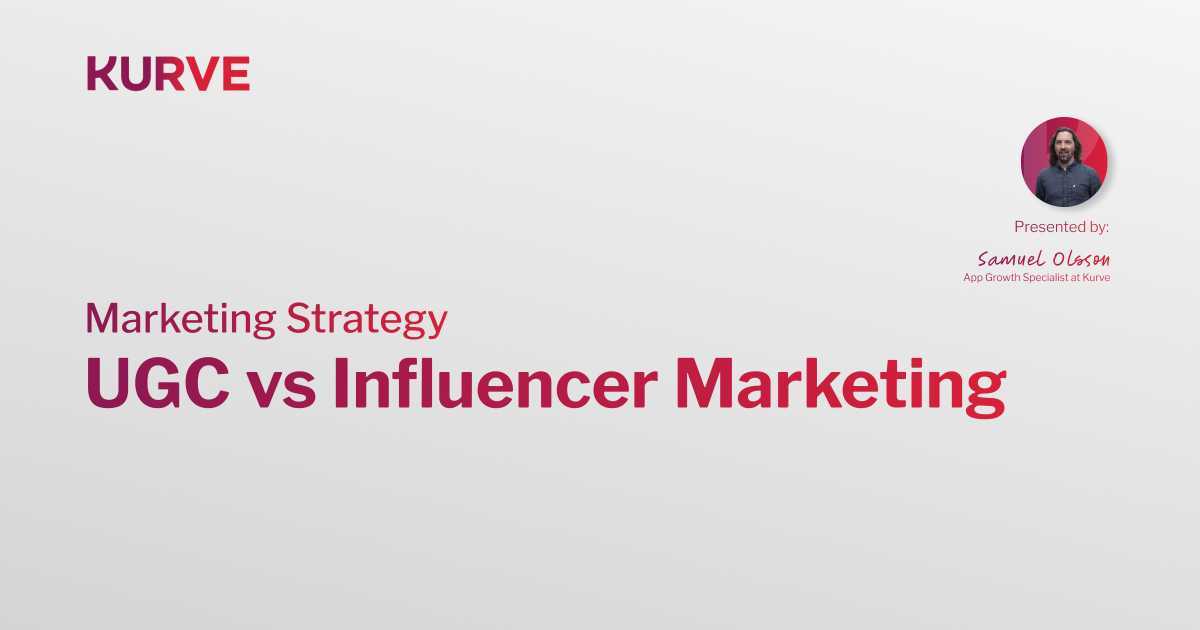Making a Name: How to Choose the Perfect App Title
When it comes to app success, crafting the perfect app title is as vital as developing the app itself.
As app developers, digital marketers, entrepreneurs, or marketing professionals, you understand how crucial every detail is. In an ocean of apps, your choice of a name can be the lighthouse that guides users to your app.
Our work with Sweatcoin is an excellent example of how an app title can impact your app's reach as part of the broader app marketing strategy.
In this guide, we'll share steps and best practices for crafting outstanding app titles.
Why is Planning a Mobile App Title Important?
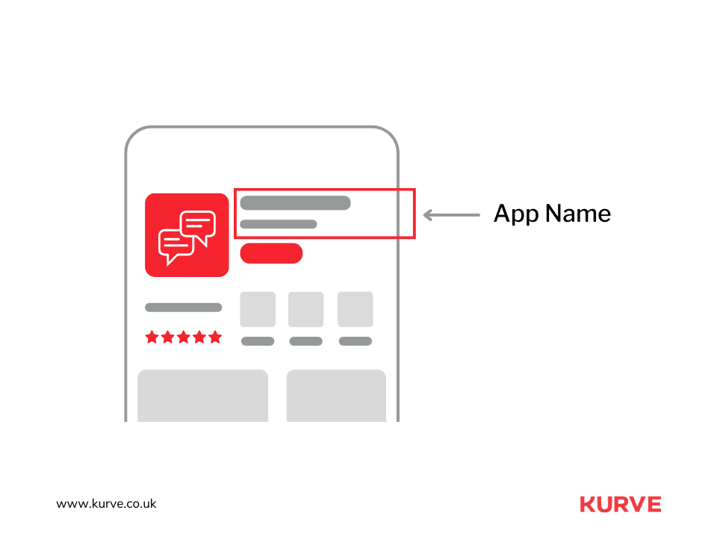
The success behind a mobile app isn't only in its performance or attractive interface. It starts right from the choice of app title.
Before your app features in the markets, your title shoulders the responsibility to attract curious eyes, encapsulate your app's functionality and stave off obscurity amidst the sea of competing apps.
Numbers from our research demonstrate the exponential growth of mobile apps. Now, more than ever, planning your mobile app title has become a priority you can't afford to sideline.
First Impression Matters
Think about your actions while browsing through an app store. The first thing that grabs your attention is the app's title. It's like a 'hello'—the user's initial point of contact with your creation.
A well-planned title seizes this opportunity to create a positive first impression. Consider it your chance to invite potential users into your digital home, enticing them to explore your app further.
An engaging app title serves as the front door of your app. It encourages people to step in, foster curiosity, and turn interest into downloads.
Branding and Recognition
Much like a catchy tune gets associated with a song, your app's title helps cement your brand in the user's mind. The more memorable and unique it is, the better it sticks, fostering recognizable branding.
The power of a well-chosen app title can help your brand become synonymous with a particular need or category. Think of the times you've used a brand name like Photoshop to refer to image editing. That's the power of effective branding.
So, when planning your mobile app title, aim for that association level. A well-named app can become the first preference whenever users think of that category.
Enhanced Discoverability
With millions of apps populating the digital landscape, the battle for visibility has grown fierce. But guess what? App stores have search functions, and they use algorithms to match user queries with app titles.
A title that's planned and rich with relevant keywords can play a pivotal role in increasing your app's visibility. When a prospective user types in a related search, your app could be one of the first they see, enhancing your app's discoverability among your target audience
Remember, the easier users can find you, the closer you are to that awaited app download!
User Expectations
An app's title is not a catchy phrase—it's a promise in text. It sets users' expectations about what they can achieve with the app and its primary function.
Think of your title as a clear and concise answer to the user's question: "What can this app do for me?" A title that indicates the app's functionality reduces the chances of users downloading something they didn't want and boosts overall satisfaction.
After all, meeting user expectations starts with making clear promises. Something as simple as a well-thought-out app title can serve that purpose.
Competition Differentiation
There are millions of apps out there. Standing out amongst that crowd is crucial for survival and growth. In this scenario, your app's title becomes more than a label—it's a distinctive beacon that separates you from the crowd.
Crafting a unique and compelling app title is like carving out your corner in the app marketplace. It pinpoints and underlines the unique selling point that distinguishes it from competitors.
Sometimes, your title catches a user's eye, piquing their curiosity. A potential user scrolling through the app store might stop at your standout title and decide to give your app a go.
App Title Guidelines: Google Play Store and Apple App Store
Even the most creative app titles must adhere to specific app store regulations.
In this section, we will navigate the title guidelines of two key players in the app universe: Google Play Store and Apple App Store.
Ensuring compliance will not only prevent potential issues but also increase your app's chances of success.
Google Play Store
Adhering to Google Play Store's guidelines for app titles is a vital aspect of your app's visibility and approval process. Considering Google's emphasis on a simple yet informative title, let's examine a few crucial points to abide by:
- Keep your title under 50 characters to ensure its readability and visibility on various devices.
- Avoid misleading or excessive keywords, as Google values titles that are honest and to the point.
- Refrain from using all capital letters or excessive special characters, which could clutter your title.
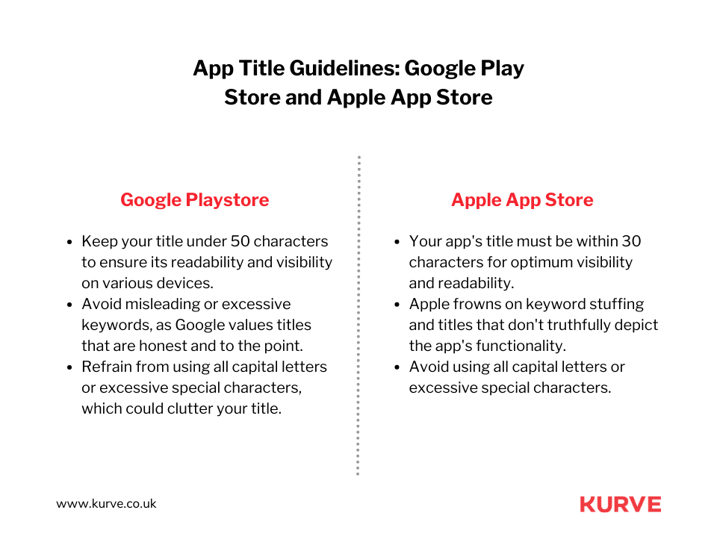
By following these guidelines, you'll improve the chances of your app standing out and garnering approval from the Google Play Store.
Apple App Store
Moving on to the Apple App Store.
The requirements here differ, and your app's title must fall within these guidelines to secure your spot on the platform.
Here are some essential tips to keep in mind:
- Your app's title must be within 30 characters for optimum visibility and readability.
- Apple frowns on keyword stuffing and titles that don't truthfully depict the app's functionality.
- Avoid using all capital letters or excessive special characters.

Sticking to these guidelines ensures your app title harmonizes with Apple's straightforward and user-centric approach.
5 Steps on How to Choose a Perfect App Title
Choosing the perfect app title involves a strategic process.
We'll guide you through the leading steps:
- Understanding your audience
- Conducting competitive analysis
- Conducting keyword research
- Ensuring uniqueness and memorability
- Seeking testing and feedback
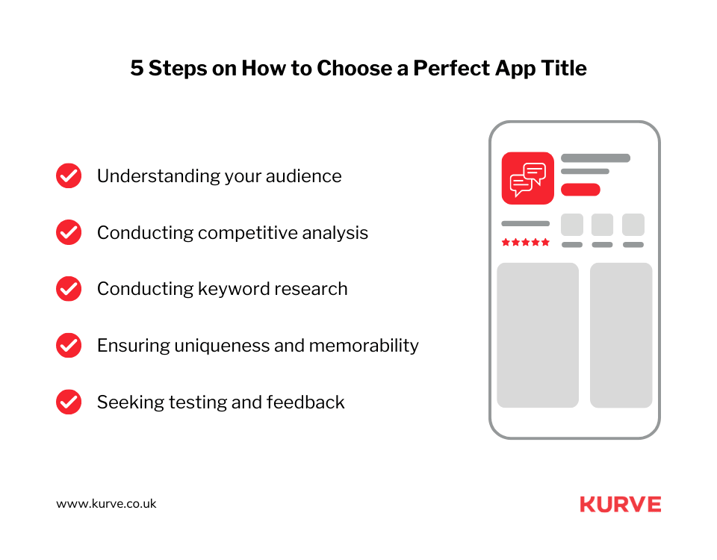
While you continue to read, remember to check out Kurve's Google App Campaigns Optimisation Guide. It’s a helpful resource built on our expertise in driving efficient app installs and in-app engagement.
Understand Your Audience
Every great product starts with understanding its users, and app titles are no different. Take a deep dive into your target audience's world. Identify their preferences, lifestyle, and problems your app can solve.
Examine factors like demographics, interests, and preferred language. This insight shapes your title decision. When you speak the language of your audience, your app title doesn't just get noticed; it inspires downloads.
Now, armed with this comprehension, you're ready to craft a title that resonates with your audience in the App Store.
Competitive Analysis
In an app market teeming with competition, standing out is essential. Take some time to analyze your competitor's app titles and keywords. What seems to work for them? Where do they miss the mark? These observations can be a goldmine of inspiration for your app title.
Find the gaps and opportunities they've overlooked. They can guide you to distinctive keywords and unique angles for your app.
Now, you must ask, what makes your app different? Your unique selling point shouldn't only be a feature; the distinction you bring to the app store starts with your app title.
Keyword Research
In the digital landscape, getting found starts with the right keywords. Begin by conducting keyword research to pinpoint relevant and high-traffic search terms. Tools like Google Keyword Planner or App Store Optimization (ASO) tools can offer a helping hand.
Curated keyword research will unearth search terms that potential users might use to find your app. Once you've identified these keywords, weave them seamlessly into your app title. It's like mapping a digital highway, directing your audience to your app.
Remember, a thoughtfully keyword-enriched title can improve your app's visibility and popularity.
Uniqueness and Memorability
A catchy title can set your app apart from the crowd and linger in the minds of your audience. While you should avoid generic or complex titles, getting creative can be a game-changer. Consider using alliteration, rhyme, or puns if they fit your app's theme.
For instance, take popular app titles like Instagram or WhatsApp. These names stand in their own right, are easily pronounceable, and memorable. The rhyme in TikTok makes it fun and catchy.
Maintaining the delicate balance between creativity and clarity will ensure your app's title resonates and retains individuality.
Testing and Feedback
Your app title might make perfect sense, but how does it fare with your potential audience? Take the time to test your title with a focus group or a select set of beta users.
Does it pique their interest? Is it clear and understandable? Gather their feedback and comprehensively assess their reactions to gauge your title's capacity to attract and engage users.
Feel free to iterate and refine the title based on this user input. App development is an evolutionary journey - your app title is no exception.
5 Best Practices When Creating an App Title
Now that we've walked through the steps to choose the perfect app title, there are five best practices you need to keep in mind while creating the title:
- Keep it short and sweet
- Be clear and simple
- Use keywords wisely
- Highlight USPs
- Consider localization
These best practices will assist you in crafting a title that's effective in attracting your target audience.
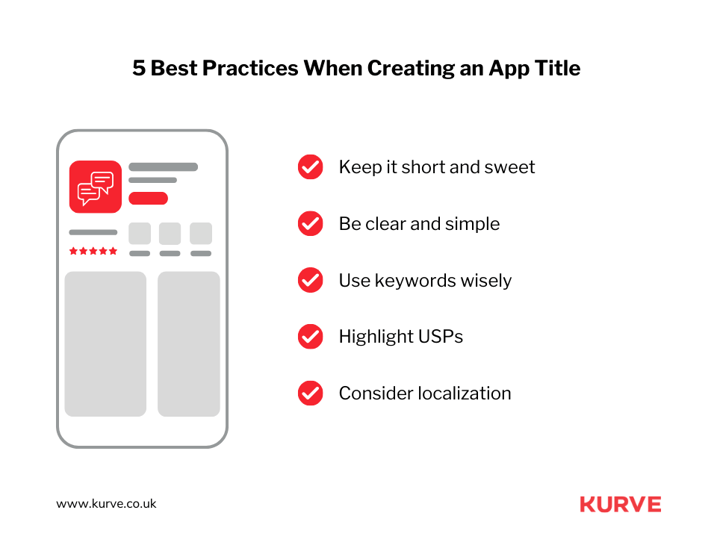
Keep It Short and Sweet
When naming your app, keep it short and to the point. Why is this important? Two reasons - users find shorter titles easier to remember and type in app stores.
Avoid cluttering your title with unnecessary filler words that don't add value or enhance meaning. Instead, craft a title that reflects your app and leaves a lasting impression.
If possible, aim for a title within the 25-30 character range. This length is comprehensive enough to express your app's essence without becoming too unwieldy. Remember, brevity is the soul of wit, even with app titles!
A perfect example of keeping a title short and sweet is "Uber". The name is short, memorable, and instantly conveys the application's purpose without any added fluff.
Clarity and Simplicity
Your title is the first thing potential users see, so it's paramount that its meaning is clear at first glance.
A simple, understandable title fosters an immediate understanding of what your app does. This quick comprehension can be the difference between a tap on the download button and a pass. The name "Snapchat" reflects this principle marvelously, the title itself conveying the app's functionality of quickly sending ('snapping') photos/videos ('chats').
By steering clear of industry jargon and complex terms, you're making your app accessible to a broader audience. Only some people understand tech terminology. A title filled with jargon might deter users rather than pique their interest.
So, keep it clear and straightforward—you can't go wrong with that approach.
Use Keywords Wisely
The strategic use of keywords can increase your app's visibility in the app store search results. However, it would help to position your primary keyword near the beginning of your title for maximum impact.
Avoid the temptation to overstuff your app title with multiple keywords, though. This approach may seem appealing for search optimization, but it works against you. An overstuffed title can come off as spammy, pushing away potential users before they even get to know your app.
The popular "Angry Birds" game is an excellent example, where instead of keyword stuffing, the title focuses on one keyword that accurately defines the app's content and keeps it user friendly.
Relevance is critical. The keywords you choose should reflect the core functionality of your app. This ensures your app reaches the right audience and sets clear expectations for potential users of what your app provides.
Highlight Unique Selling Points
Your app's title is the perfect stage to showcase what sets your app apart from the crowd. Include a feature or benefit unique to your app that might grab potential users' attention.
Think about the aspects of your app that provide the most value to users. Are there unique features, integrations, or benefits that differentiate your app? These need to shine through in your title. For instance, consider the app "Amazon Kindle"; its title effectively positions it not just as a digital reading platform but directly associates it with the vast Amazon bookstore.
Last but not least, it piques users' curiosity. An intriguing title prompts an immediate desire to explore more about your app. Have your title unlock this sense of wonder, helping users unearth the value lying within your app.
One app that perfectly leverages this approach is "MysterySolver". The name itself provokes curiosity and interest, hinting at the problem-solving adventure that the game app provides, leaving users tempted to unlock the mystery within.
Consider Localization
If you're looking to grow your app globally, it's crucial to choose a title that translates well. A title that makes perfect sense in one language might appear nonsensical or even offensive in another. Think about the social networking app "Facebook" — its name is universal and easily understood in many languages.
To avoid potential confusion or cultural missteps, select a title that can fit into multiple cultures. Deploy extra creativity to ensure your app's title maintains its essence and meaning even when translated into different languages. The "Duolingo" language learning app does this well, using a title formed from a mix of "duo" and "lingo," which is easily recognizable and applicable in numerous languages.
Don't let language barriers limit your app's potential to shine worldwide. Make your app title truly global, just like the popular music streaming app "Spotify", which has a distinctive, short, and meaningful name that resonates in various languages and regions.
Make a Name in App Stores
Choosing the perfect app title involves a range of factors. At Kurve, we pride ourselves on our deep understanding of app marketing and approach these considerations precisely.
If you've found these insights beneficial, we invite you to delve further into our knowledge hub. For more personalized assistance, don't hesitate to reach out to our team.
Together, we can help you choose the title that gives your app its deserved spotlight in the app world.


